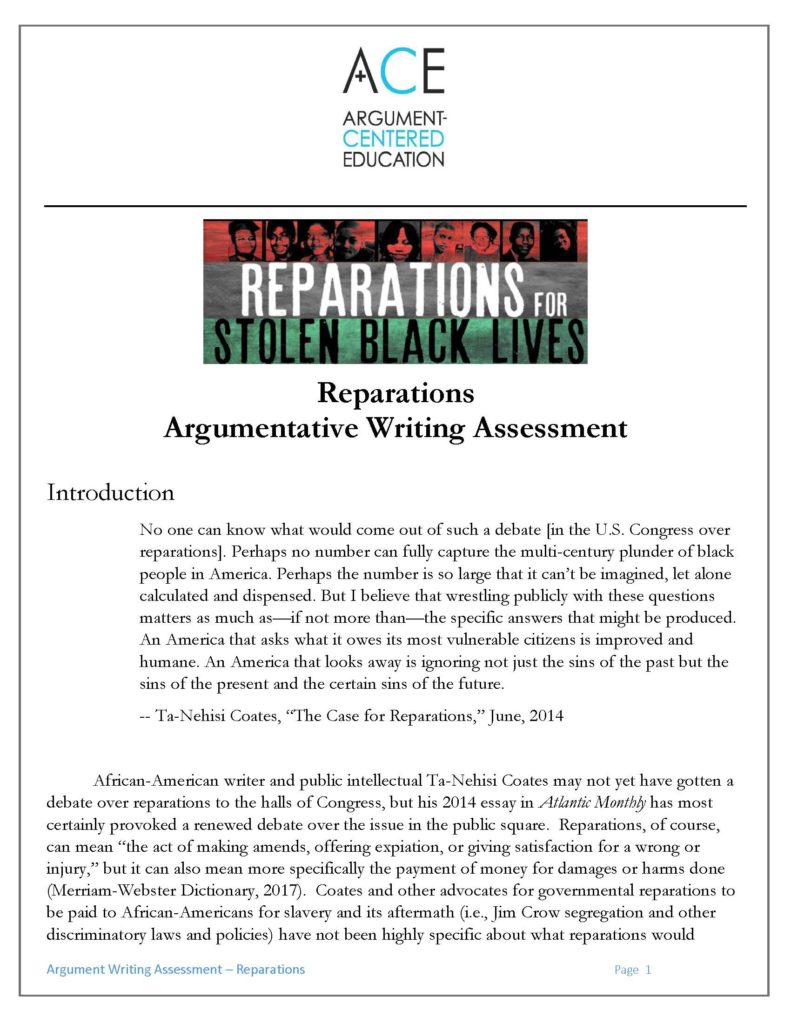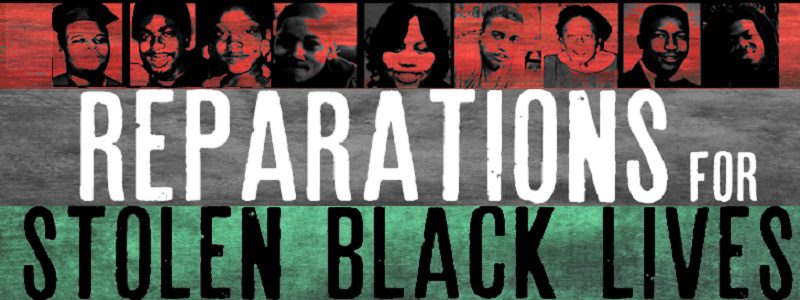
Reparations for the Historical Legacy of Racism — An Argument-Centered Approach
No one can know what would come out of such a debate [over reparations]. Perhaps no number can fully capture the multi-century plunder of black people in America. Perhaps the number is so large that it can’t be imagined, let alone calculated and dispensed. But I believe that wrestling publicly with these questions matters as much as—if not more than—the specific answers that might be produced. An America that asks what it owes its most vulnerable citizens is improved and humane. An America that looks away is ignoring not just the sins of the past but the sins of the present and the certain sins of the future.
— Ta-Nehisi Coates, “The Case for Reparations,” June, 2014
There is no issue more controversial, or more essential to an understanding of American history and society, than the issue of race. This is the second in a short series of posts that reflect work that we have done this summer to prepare argument-based units on social science issues of particularly strong interest to secondary and middle school history and English departments, going into the 2017/18 school year. This post develops a unit on reparations, and whether the United States has a moral debt to African-Americans, because of its historical legacy of anti-black racism, that it is obligated to pay in a material way.
Overview
African-American writer and public intellectual Ta-Nehisi Coates may not yet have gotten a debate over reparations to the halls of Congress, but his 2014 essay in Atlantic Monthly has most certainly provoked a renewed debate over the issue in the public square. Reparations, of course, can mean “the act of making amends, offering expiation, or giving satisfaction for a wrong or injury,” but it can also mean more specifically the payment of money for damages or harms done (Merriam-Webster Dictionary, 2017). Coates and other advocates for governmental reparations to be paid to African-Americans for slavery and its aftermath (i.e., Jim Crow segregation and other discriminatory laws and policies) have not been highly specific about what reparations would provide to current black citizens of this country (though Coates refers at one point in his essay to a figure of $35 billion, to be paid out over ten years). What he has been clear about is the compelling moral justification for significant financial compensation coming in some form to the descendants of those who have borne the burden of the history of anti-black racism in this country.
Coates goes through the economic history of slavery: that it was the driver of a substantial portion of the wealth generated in America between the time of its introduction to Jamestown in 1609, through its abolition in 1865. He also tells the lesser-known historical story of the exploitation of black people in the Jim Crow South and the criminally discriminatory North, bolstered by federal housing and other laws. The disastrous economic plight of the average African-American family, compared to its white counterpart, is a product of this history, and this country will never be morally whole until it faces, acknowledges, and rectifies this reality.
Coates’s eloquence and persuasive power in his 2014 essay (and subsequent media tour) have generated the kind of debate (at least among writers and commentators, if not elected officials) that he called for. Opponents of reparations have made a range of arguments, some philosophical, some practical, some defending the interests of the majority of the country that isn’t black, and some from the perspective of the interests of African-Americans themselves.
Today, proponents of reparations can point to a handful of recent cases where the courts or legislatures have passed reparations laws – in Chicago, notably, the City Council approved $5.5 million to be paid to the victims of racist police commander Jon Burge. But the nation as a whole has not yet moved closer to adopting a national reparations program for the slavery and the legacy of anti-black racism in this country. Still, the moral force of the question raised in the Coates essay remains and resonates.
Debatable Issue
Should the United States pay reparations for slavery and the historical legacy of anti-black racism?
Sources
The textual and visual media sources for use in this unit are combined into our Media List.
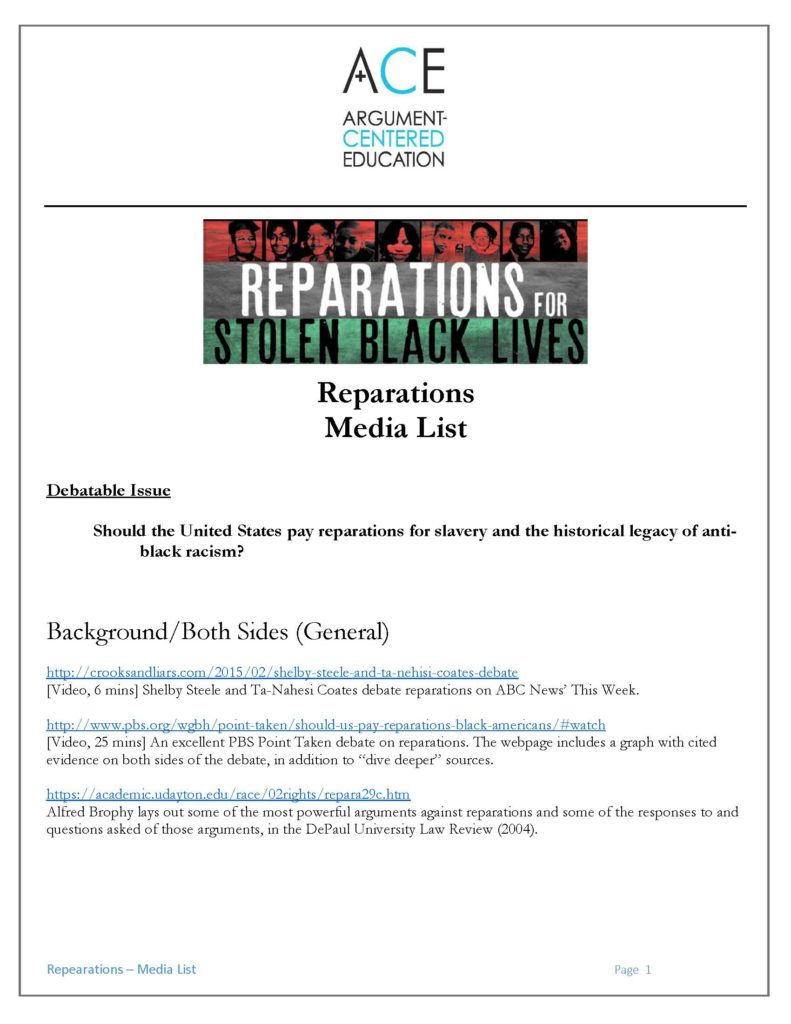
To make it easier for our partner schools to access and screen crucial video documentary shorts, we downloaded them and embedded them here, though in this unit only one of the several videos in the Media List is available for download.
Selected Passages and Infographics
We incorporate the use of Selected Passages and Selected Infographics documents to scaffold students’ evidence selection and research skills. We use them more extensively with students less experienced with academic argumentation, and less extensively with students more experienced.
Here are the Selected Passages and Selected Infographics documents for the reparations argument-centered unit.
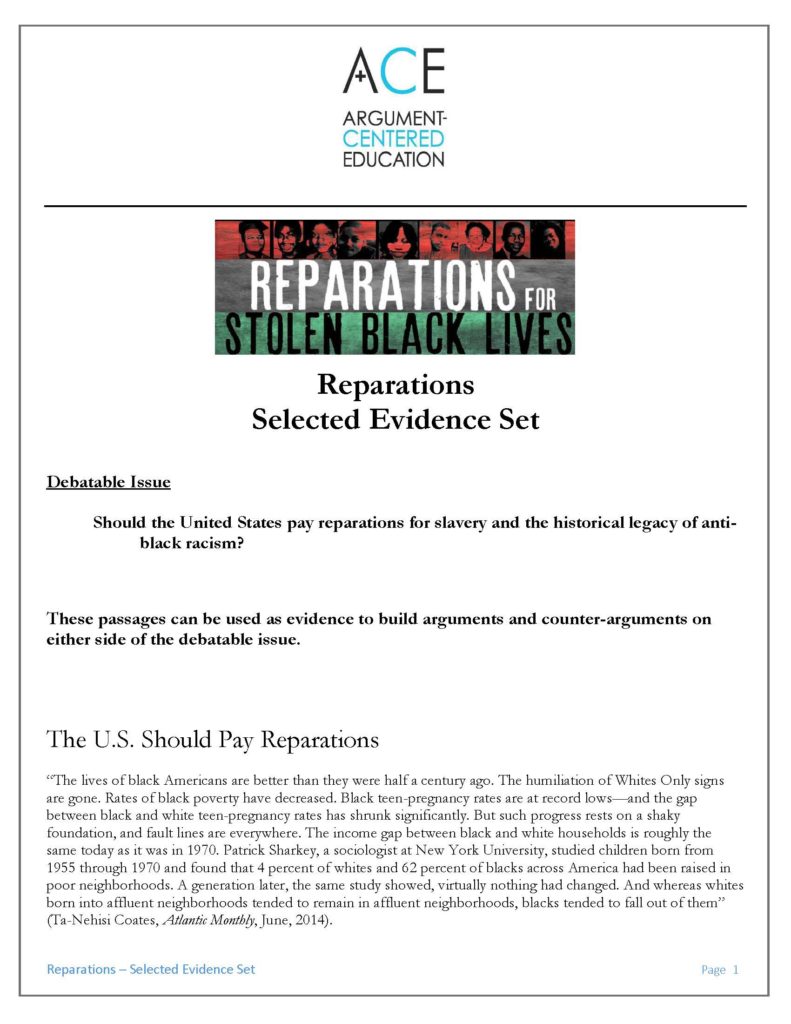
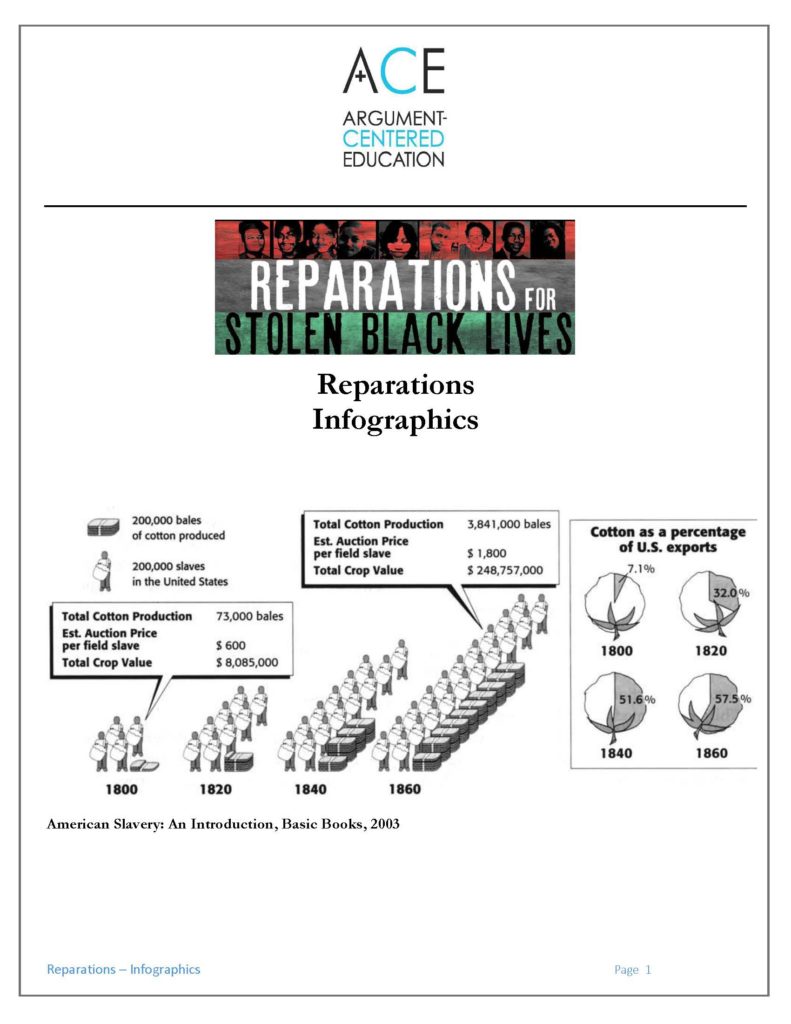
Claims and Counter-Claims
Another scaffolding method and teacher resource we incorporate (as an instructional option) are sets of possible claims and possible counter-claims. These have a wide variety of uses: they can be distributed to sides in a Refutation Two-Chance activity, to facilitate getting to the refutation stage of the game; they can set up an Close Evaluation of Arguments activity; or they can help students get started in their argument building or argument writing.
It is always a solid foundational strategy for teachers to walk into an argument-centered unit — on any content they are teaching — with a set of claims and counter-claims that students can make and support on the issue. Having these sets of possible arguments and counter-arguments ensures that the issue as you have framed it is balanced and focused enough to generate viable claims on both sides. To produce these sets you also need to have at least mentally scanned through the content resources and identified evidence that students can find and use to support these arguments. And finally these sets help guide your organization of content instruction around argument. They are, in short, vital argument-based instructional resources.
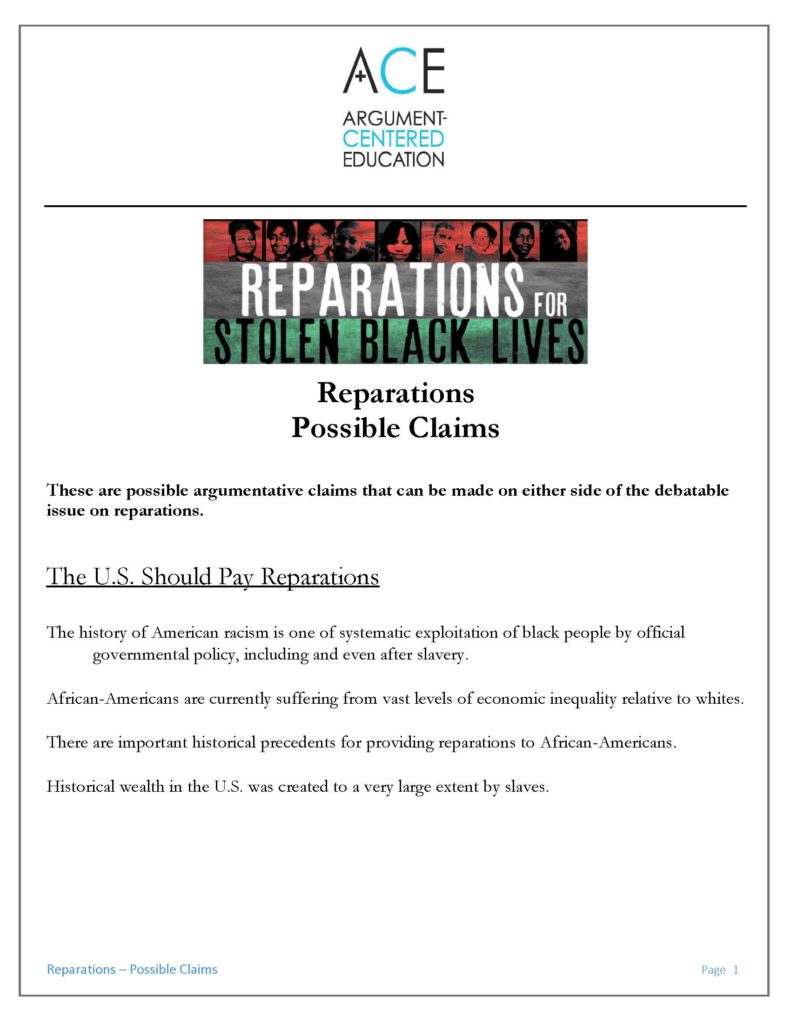
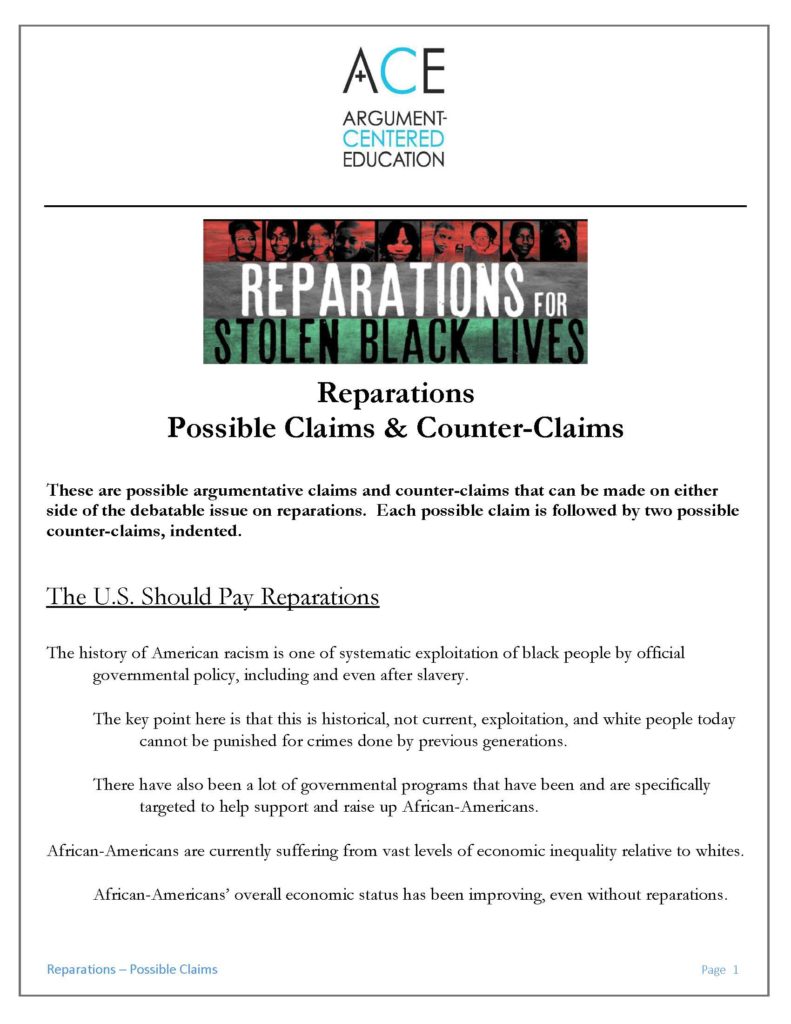
Applications
As with other argument-centered units, there are a good number of argument-centered applications that can be used to engage students in the academic work students should be asked to do to activate and demonstrate their learning about reparations and the history of American racism.
Argument Essay
Students can simply be required to write an extended argument essay that requires them to put together their ideas and weigh in on the issue of reparations.
Carefully read and annotate the attached set of secondary-source document excerpts. Use information from at least four of the sources in a coherent, well-developed essay that has an introduction, argumentative body, and conclusion. Your essay should take a clear position, stated in a thesis, on the issue. Your thesis should be supported and developed by 2 – 3 arguments. Each argument should have a claim, evidence, and reasoning, using one or two pieces of evidence from the set of sources. You should also address and refute at least one counter-argument, either in a separate paragraph or in your argument paragraphs.
Use the set of sources to identify evidence that will support your claims, and supply your own reasoning to explain how it is that each piece of evidence proves that your claim and your overall position are true. Avoid merely summarizing sources. Indicate clearly which sources you are drawing from, whether through direct quotation or paraphrase.
Other Argument-Based Activities and Projects
Lucy Calkins and her colleagues, in her 2013 book The Research-Based Argument Essay, affirmed the value of conducting oral argumentation and debates in class prior to writing.
We’ve come to believe that it would be advantageous to students if we found opportunities throughout the day to immerse them in a culture of debate, or argumentation (in the best sense of the word). And we believe that it would invigorate the school day to find many opportunities, often, for students to take and defend positions, to learn from argument and counterargument. The research is clear that if students have opportunities to do the work orally that we hope they will learn to do as writers, this is advantageous to them.
These activities and projects can substantially improve and deepen students’ organization, critical thinking, use of evidence, and effectiveness in engaging with the other views and ideas on the issue. Or they can stand on their own as a summative assessment or unit project on the issue of reparations and the history of American racism.
